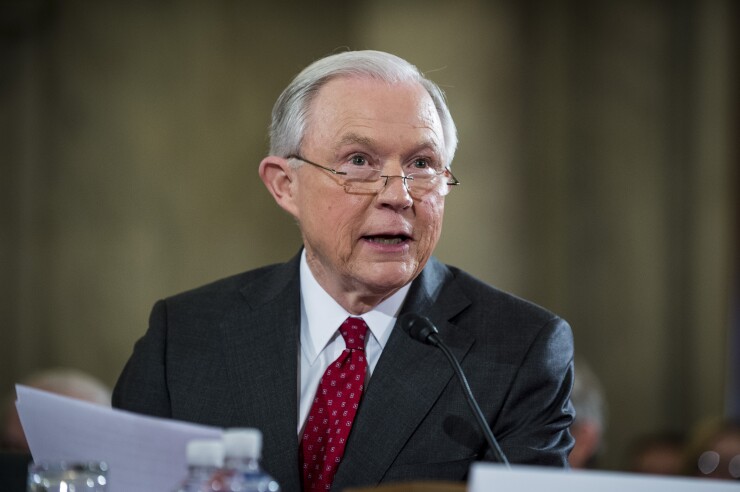WASHINGTON — Attorney General-designate Sen. Jeff Sessions R-Ala., could pose a roadblock for marijuana businesses seeking financial services, but might also end a controversial Justice Department program targeting payment processors and financial institutions.
During his nomination hearing Tuesday before the Senate Judiciary Committee, Sessions said he would enforce federal marijuana laws, a change from the Obama administration, which has often deferred to states where pot has been legalized.
"Congress has made the possession of marijuana in every state and the distribution of it an illegal act. So if that's something that's not desired any longer, Congress should pass a law to change the rule," said Sessions. "It's not so much the attorney general's job to decide what laws to enforce. We should do our job and enforce laws effectively."

His comments are a blow to marijuana businesses in Colorado and other states which have complained that they are being denied access to the banking system because financial institutions fear a crackdown by federal law enforcement and banking regulators. Such firms have been lobbying policymakers to clarify that banks can do business with companies that are legal under state law.
If Sessions is confirmed and pursues local pot businesses, banks may become even more uncomfortable with having such firms as clients and further restrict access.
Yet Sessions also provided hope for bankers who have objected to the Justice Department's Operation Choke Point, which aimed to cutoff bad actors from the banking system by targeting financial institutions that did business with industries deemed to have a higher risk of nefarious activity.
Senate Banking Committee Chairman Mike Crapo, who also sits on the Judiciary Committee, asked Sessions if he would end Choke Point if confirmed as Attorney General.
"This program is one where the justification is 'well the businesses that operate in these industries have not done anything wrong but these are industries that might do things wrong more than other industries, therefore we are going to pressure people out of these industries,'" said Crapo, who compared the program to the 2002 movie Minority Report where the government tried to prevent crimes before they were actually committed.
The program represents "the kind of abusive use of power that I hope you help stop and prevent from continuing to happen," added Crapo.
Sessions said he wasn't familiar with the program but "fundamentally a lawful business should not be attacked" for doing business with another lawful firm.
"Maybe they have some arguments that would be worth listening to, but fundamentally that seems to me… that goes beyond what would be legitimate in a great economy like ours," said Sessions.





